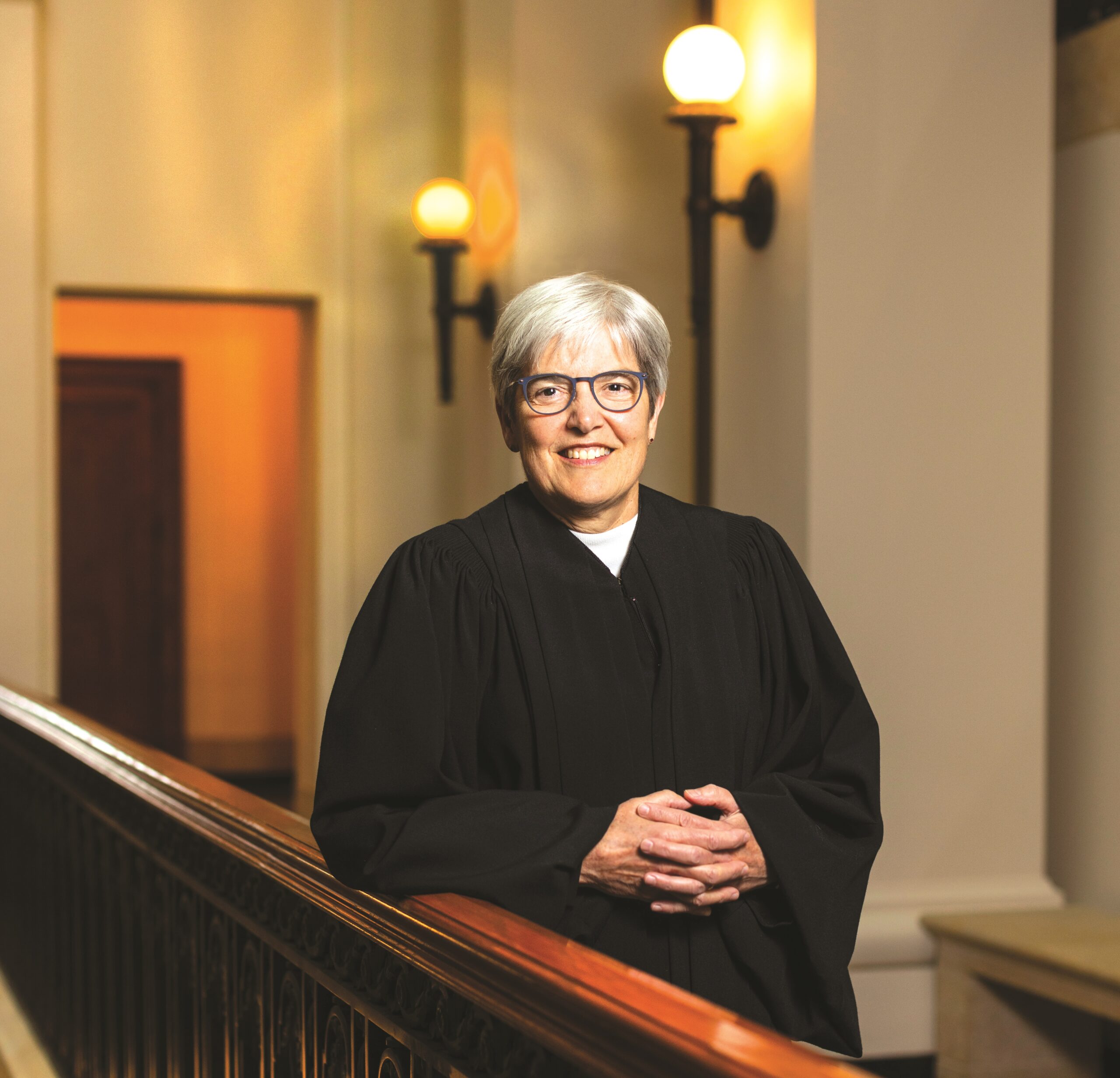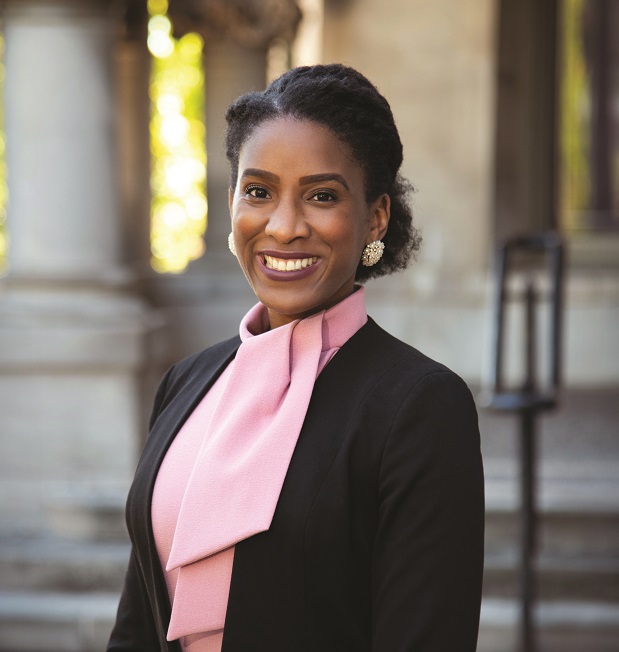Minnesota Supreme Court Justice Margaret Chutich has never shied away from competition. Growing up in Anoka, Minnesota, in the 1960s and ’70s, she started playing tennis at the age of 9, and by age 11 was ranked first in her age group. By the time she got to ninth and 10th grades, few girls could play at her level, so she joined the boys’ teams, and compiled a winning record.
With Title IX in 1972 came more opportunities for girls, including, in Chutich’s junior year, the first Minnesota State High School League girls’ tennis tournament. The young star decided to switch to the girls’ team, for two reasons: She wanted to play in that first tournament, but also because she recognized, as she recalled recently, “if all the best girls’ players were playing on the boys’ teams, the girls’ teams wouldn’t improve that much.”
The decision paid off: Chutich made it to the state tournament in singles that first year, losing only to the eventual state champion. She returned her senior year and won the singles championship. The story illustrates not only Chutich’s drive and determination, but her generous spirit, foreshadowing the way she would use opportunities to lift others up throughout her life.
At St. Thomas School of Law, Chutich has been a mentor for 14 years, and since 2018, a member of the Board of Governors. As the first openly gay justice on the state’s highest court, she has taken a special interest in making sure every person feels represented and respected, and is known for extending that care and sense of belonging to everyone she encounters.

In person, Justice Chutich is outgoing, upbeat and approachable, with an easy laugh. She describes her childhood as “idyllic,” growing up the third of four kids, in a home with loving parents and doting grandparents nearby. Her family owned the local hardware store. Her father, the child of Croatian immigrants, nurtured her love of the outdoors.
A natural athlete, Chutich gravitated early to sports, playing tennis, softball and basketball, but also to music – she has played the piano since first grade and played the clarinet in high school. In both music and sports, she learned, “If you do devote time to things and practice, you can get better,” she said.
After graduation, she headed to Stanford, where she played varsity basketball. She says she loved her experience there, but transferred to the University of Minnesota, where she starred on the tennis team. She graduated as a history major and won a scholarship to spend nine months at the University of Zagreb, studying Croatian, before heading to the University of Michigan for law school.
Then Chutich got the opportunity of a lifetime: clerking for the late Judge Diana Murphy on the federal district court. “I learned what an excellent judge should do: how to conduct a courtroom; how to craft opinions. I learned from her the importance of trying to do your work promptly, because people are out there waiting for those decisions that are affecting their lives.”
Justice Margaret ChutichIf you do devote time to things and practice, you can get better."
And she gained confidence. “When I first started working for [Judge Murphy], I was reluctant to give her recommendations,” Chutich recalled; she felt that she didn’t know enough. But the judge told her that her job was really to do the best that she could – advice she holds to this day.
After years as an advocate in private practice, working as an assistant U.S. attorney and at the Minnesota Attorney General’s Office, Chutich was appointed to the Minnesota Court of Appeals in 2012. In 2016, Gov. Mark Dayton appointed her to the Minnesota Supreme Court, and she was elected to her position in 2018.
Chutich married her longtime partner, Dr. Penny Wheeler, in 2013, as soon as same-sex marriage was legal in Minnesota. She and Wheeler have now been together for more than 25 years. (Dr. Wheeler is a member of the University of St. Thomas Board of Trustees and a physician who retired as the chief executive of Allina Health in 2021.)
The couple adopted a daughter, Olivia, from Guatemala, and raised her together. The family suffered a tragic loss in January 2021 when Olivia died at age 21 of hypothermia and alcohol on her first day back at Iowa State. The sudden loss of their beautiful and vibrant daughter – “our walking exclamation point,” as they called her – has been difficult, Chutich said, but going forward, she aims “to love others in my life as best as I can, to honor her spirit.”
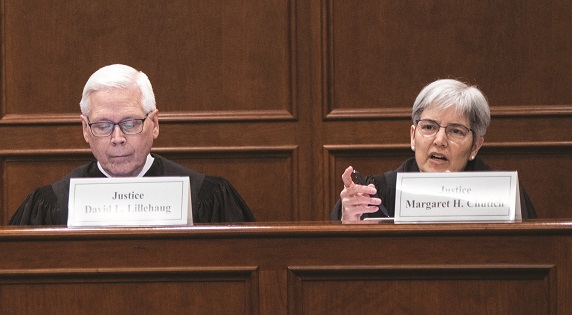
Chutich is one of four women justices on the Minnesota Supreme Court – a female majority. Though the seven justices bring different life experiences to the court, Chutich said the state’s highest court remains a haven of civility, even at a time of deep political divisions. “There is a real esprit de corps here, and I think for the most part we agree to disagree without being disagreeable, which is really important.”
Justice Chutich has two recent St. Thomas Law graduates clerking for her this term – Megan Massie ’22 J.D. and Mary Clare Mulcahy ’22 J.D. Massie said she’s been impressed with the way the justice prioritizes writing her opinions in a way that the general public can understand, noting “she’s always thinking about the impact she will have.”
Mulcahy added that Justice Chutich is a great role model in many respects, including her dedication to self-care: “I get outside and exercise every day, and I can do that because my boss prioritizes it.”
Chutich first became involved with St. Thomas through Judge Murphy, who was instrumental in the reopening of the law school in 2001. She introduced Chutich to Lisa Montpetit Brabbit, associate dean for external relations, who in turn recruited Chutich for the Mentor Externship Program. “Justice Chutich is what I would call a professional exemplar,” Brabbit said, “not just for the way she does her job, but for who she is as a person.”
Rob Vischer, former dean of the law school and now president of the University of St. Thomas, added “she is an exceptionally kind and caring person. She models for our students the fact that you can occupy a position of prominence and power without compromising your commitment to affirming the dignity of every person you encounter.”
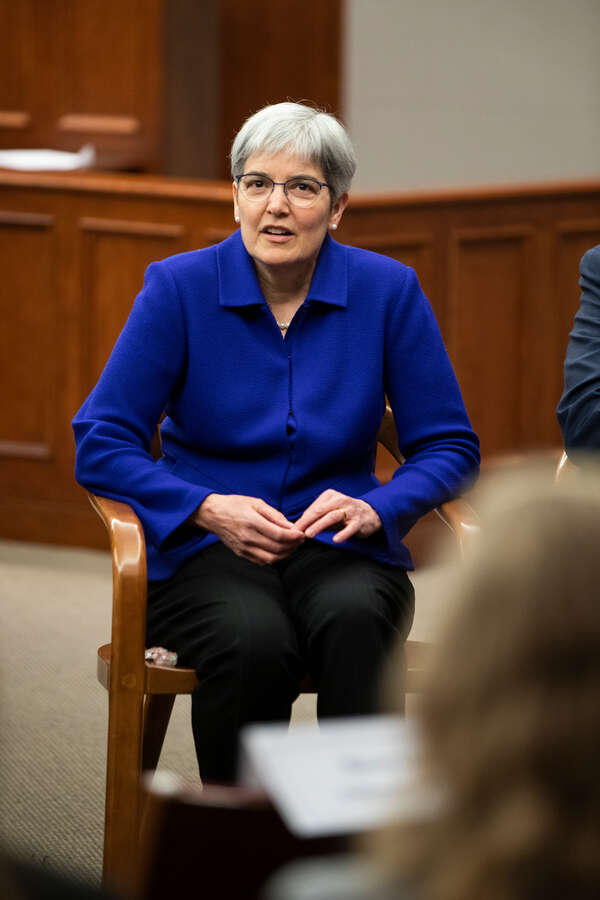
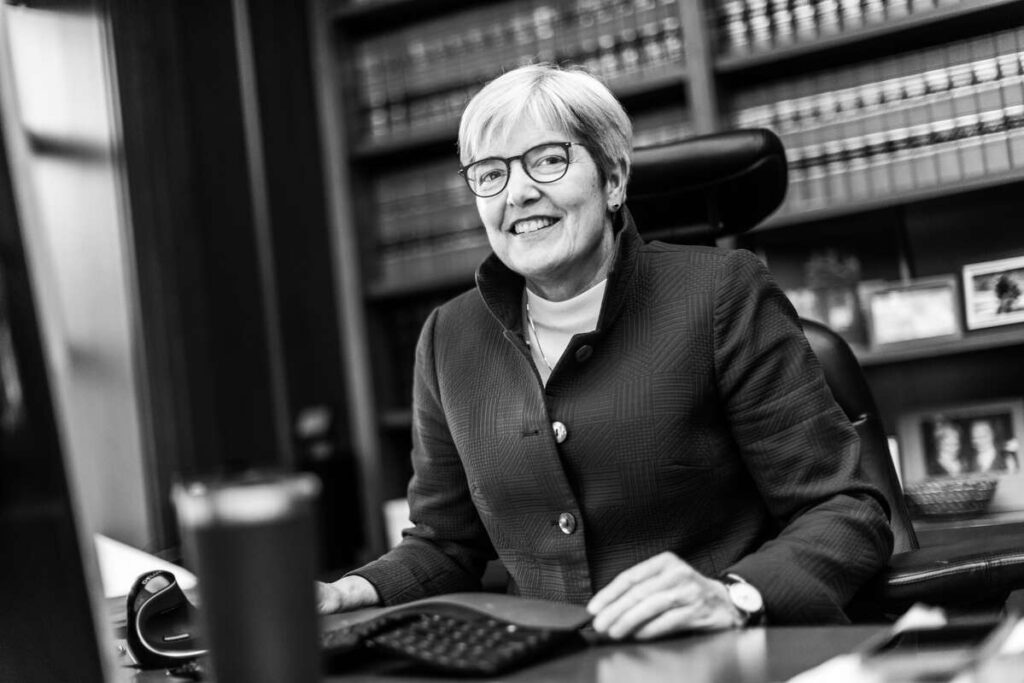
For her part, Chutich said she gets a lot out of her encounters with her mentees: “They’re really enthusiastic and I find that invigorating, to get to know young people who have a desire to change the world.” Early on, Chutich said, many of her mentees were young Black women and she appreciated the opportunity to talk to them about racial issues frankly and directly. She has also had some LGBTQ+ students as mentees, she said, “and I think they see me as a sign that they’re not going to be excluded from the highest levels of law at the state of Minnesota just because of their sexual orientation.”
“I have always appreciated Catholic social justice efforts: helping the poor, feeding the hungry, all of those parts really appeal to me, and I like that the law school is really emphasizing the full development of people,” Chutich said. “I really resonate with the mission of the school,” she said. “It’s for the common good. It’s not just about trying to learn to be the best litigator that you can be, it’s about using your skills to help people.”
Justice Margaret ChutichI have always appreciated Catholic social justice efforts: helping the poor, feeding the hungry..."
Still, when Justice Chutich was asked to join the law school’s Board of Governors in 2018, she felt some hesitation, given some of the Catholic Church’s past statements on gay people. But a lesbian friend who had served on the board before her assured her it was a welcoming environment, and Chutich said she has found that to be true.
“There is a diversity of intellectual thought there, that I think, frankly, is a good thing for law students to see.” As with the court, “It’s about modeling how to have different viewpoints in a collegial fashion, or at least a civilized fashion. That’s really a dangerous thing in our society today – if people disagree with you, you’re not misguided, you’re evil. We have to have a successful democracy – we can’t have people interacting in such a toxic manner.”
St. Thomas is training people who care about the community, and people who care about those who haven’t had the same opportunities, she said. “They’re training people who can learn to get along with people who don’t have the same opinions as they do.”
All that, Chutich said, means the school’s mission is more relevant than ever.
This story is featured in the spring 2023 issue of St. Thomas Lawyer.
